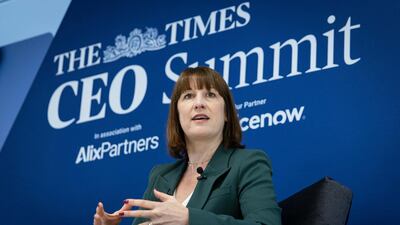For the assembled chief executives of UK Inc, the claim that the opposition Labour Party is the "natural party of business" might have been hard to digest a year ago, but it landed well at a summit on Thursday, two weeks before the general election.
Shadow chancellor Rachel Reeves told senior executives of some of Britain's largest companies they have "nothing to worry about from Labour's new deal for working people and our plans to make work pay".
Ms Reeves offered "economic stability” as she promoted a global investment summit within 100 days of the party's expected return to power.
Chancellor of the Exchequer Jeremy Hunt was also in the room and said that taxes were the fundamental difference between his Conservative Party's approach to the economy and that of Labour.
"The Labour perspective is that they believe taxation is broadly a force for good, they believe that for social justice reasons, and they are content with tax levels as they are, in fact the Labour manifesto is actually planning to increase taxes by about £8 billion [$10.13 billion] a year," he said.
"If we're going to bring down taxes, and I'm speaking as the Chancellor who put them up and put them up significantly, it is a lot of hard work. It is a lot of discipline. But I think that is very, very important for our economic future."

Ms Reeves responded by saying she does not believe "you can tax and spend your way to higher growth” and that her mission was to "make Britain the best place in the world to invest or to start and grow a business".
She added that "ending the political chaos" in Britain with a new Labour government would make the country more attractive to foreign investors.
"I want investors to look at Britain as a safe place to put your money, at a time populism is on the rise in many countries," she said.
As the two politicians traded comments on fiscal policies, elsewhere in London the Bank of England, as expected, kept interest rates on hold at 5.25 per cent on Thursday. Some Conservatives hoped for a cut to interest rates before the election, which experts say might have happened if Prime Minister Rishi Sunak waited until the autumn to hold the vote.
'A very, very difficult situation'
Mr Hunt and Ms Reeves had to put their views and manifesto promises to a large collection of Britain's chief executives.
Labour is about 20 points ahead in the latest poll and Mr Hunt told the summit that the election was "going to be very tough" for his party.
"We can certainly do a lot better than the polls are suggesting and we are working very hard to do so," he added.
Nonetheless, a poll on Thursday showed Mr Hunt was among several cabinet minister at risk of losing their seats.
There have been reports of Labour securing a "supermajority" or a landslide victory at the polls, but some experts have warned that any celebrations could make way for a more problematic reality for the party.
Prof John Curtice, from the University of Strathclyde, told the summit that the euphoria of election celebrations could be short-lived, because there are no plans in place for government spending beyond March next year.
That means that without a good degree of economic growth, the new government will be forced to cut department budgets. “The next government inherits a very, very difficult situation," Prof Curtice said.
While most of the leading business figures at the summit did not wholeheartedly throw their support behind either of the main parties, they did welcome comments about stability and attracting investment.
Emma Walmsley, chief executive of the pharmaceutical company GSK, said the approaches and policies of government and business needed to be in alignment, because "if we keep fighting with each other, our probability of success goes down".
Alex Mahon, chief executive of broadcaster Channel 4, issued a warning for the next government not to "mess it up".
“We need to be proud," she said. "We need to work in partnership with government because we won’t get there with business and government being opposed.”
Silence and support
About a month ago, more than 120 British business figures, including Jimmy Wales, founder of Wikipedia, and Richard Walker, executive chairman of supermarket chain Iceland, sent a letter to The Times declaring their support for Labour.
The letter was criticised immediately as being "lightweight". Brent Hoberman, founder of the travel website Lastminute.com, said the letter did not include support "high-profile figures".
Other business leaders have come out in support of Keir Starmer's stewardship of Labour, including Sebastian James, chief executive of the Boots chemist chain, and former Tory Party donor John Caudwell, the billionaire property developer and founder of the mobile phone retailer Phones4U.
Some donors, including billionaire Michael Spencer, are sticking by the Conservative Party despite it facing a political rout of a magnitude not seen for 100 years.
But, as the Mail on Sunday reported, Prime Minister Rishi Sunak will not attend one of his party's major fund-raising events on Thursday, the annual Black and White Ball at the Hurlingham Club in London.

Nonetheless, as a general rule, the business sector tends to keeps its head below the parapet during elections. For many companies that might have a broad customer base with a wide variety of political views, staying silent is the most prudent strategy to maintain a stable bottom line.
In the quick-fire communication world of social media, nailing your political colours to the mast would seem a foolhardy risk – you could quickly strain relationships with customers, investors and employees for little gain.


